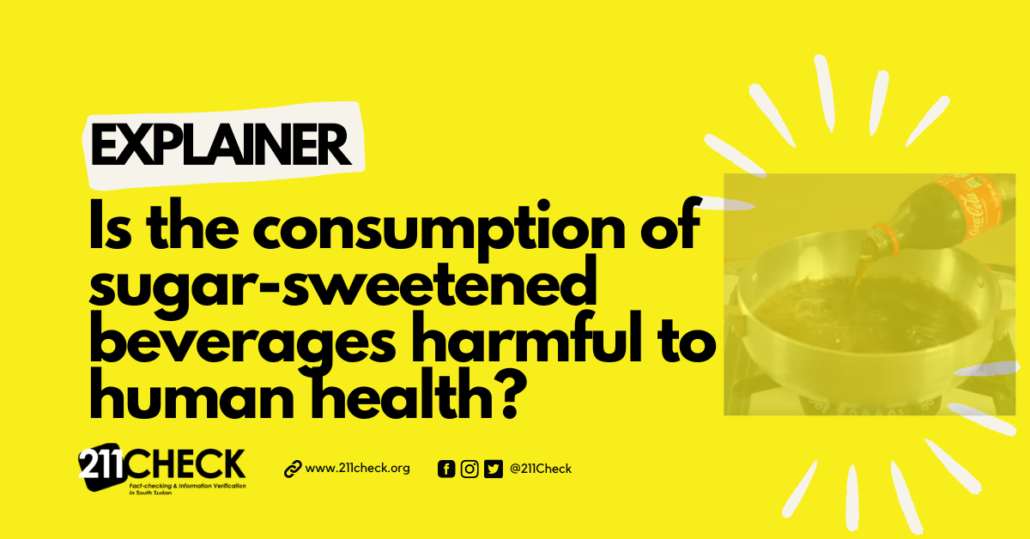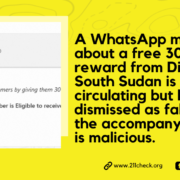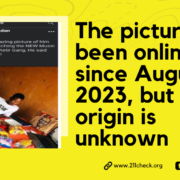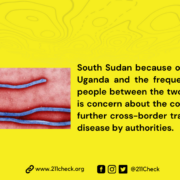Explainer: Is the consumption of sugar-sweetened beverages harmful to human health?
Writer: Ochaya Jackson
A video shared on Facebook on December 15th, 2022, and still making the rounds on social media, claims that Coca-Cola, which is one of the sugar-sweetened beverages, is not fit for the human body.
The three-minute video shows a Coca-Cola drink being poured into a saucepan and is accompanied by text that reads: “I will never buy Coca-Cola again. I discovered the secret.”
The screenshot of the heating stove while Coca-Cola drink is being poured
The video features a female voice narration demonstrating the effects of heating Coca-Cola on a hot stove in a saucepan. The narrator warns people not to drink Coca-Cola while raising questions about its chemical composition.
The video alleges that Coca-Cola contains sugar and other harmful chemicals for the body. However, it does not specify the exact nature of these chemicals in Coca-Cola drinks.
“Don’t take this. Do you know that you are in danger by taking it? I’m going to show you now why you can not take it. Look now, I’m going to put about two bottles in a pot, and I will show you the danger you are running. People often do not know what they are taking. What is really the composition of Coca-cola? This drink has its chemistry. It is not really good for [the] human body. When you take it you feel your blood pressure rise,” the female’s voice explanation about the Coca-Cola drink on the video claimed. Four people die of diabetes. It is something very dangerous. The whole world knows that the sugar level is very high. It does more damage to your health,” the narrator claims.
Additionally, the video suggests Kappa Tea as a healthier alternative, emphasising that it is produced ‘without sugar’.
Coca-Cola falls under sugar-sweetened/carbonated beverages, along with other sodas with added sugar.
Investigation:
211 Check researched on Coca-Cola drinks and other sugar-sweetened beverages, using publicly available data or literature on beverage drinks; and it gathered that excessive consumption of such drinks is unhealthy for the human body.
A study published in 2015 by the U.S.-based National Institute of Health, estimated that 184,000 people globally died due to sugary drink consumption.
“Worldwide, the model estimated 184,000 deaths/year attributable to Sugar Sweetened Beverages (SSB) consumption: 133,000 (126,000–139,000) from diabetes, 45,000 (26,000–61,000) from cardiovascular diseases, and 6,450 (4,300–8,600) from cancers. 5.0% of SSB-related deaths occurred in low-income, 70.9% in middle-income, and 24.1% in high-income countries,” indicates the study.
Similarly, a 2016 study on rats examined the effects of Coca-Cola consumption on rodents and found that those who consumed the beverage developed kidney and liver malfunctions compared to rats that did not drink it. Notably, the study emphasized the need for further research to confirm whether these effects extend to humans.
Likewise, in 2018, the National Institute of Health published a literature review detailing the impact of sugary drinks on the brain. The review revealed that sugar-sweetened beverages increase the risk of stroke and dementia due to the compounds and chemicals they contain.
According to Medical News Today, regular consumption of sugary drinks can increase blood sugar levels and affect the brain’s pleasure centres in a manner similar to heroin. There is also a confirmed link between sugary drinks and diabetes and their adverse effects on kidney and liver activity.
However, the report suggests that moderate consumption of Coca-Cola and sugar-sweetened beverages has only a minimal impact on human health.
Meanwhile, Coca-Cola Australia, in one of its advisories, acknowledges that many of its beverages contain sugar and that moderate consumption is considered healthy. Nevertheless, excessive consumption is not advisable for human health.
“Many of our beverages contain sugar, which has kilojoules. While sugar is fine in moderation, too much of it isn’t good for anyone. Consuming too many kilojoules, including soft drinks with sugar, can contribute to weight gain,” it said on its website.
Further, Coca-Cola recommends a maximum of 150 milligrams per day, which, according to Mathaauditor and Flightpedia, equals 0.15 millitters.
Fact-sheet
In 2015, the World Health Organisation (WHO) updated its guidelines on free sugar intake, recommending less than 10% of total daily energy consumption for adults and children. It further conditionally suggested reducing free sugar intake to less than 5%, equivalent to 25 grams (6 teaspoons) per day, for better health.
Free sugars include those added to foods and drinks by manufacturers, cooks, or consumers and sugars naturally present in honey, syrups, and fruit juice concentrates. A single can of sugar-sweetened soda contains up to 40 grams (around ten teaspoons) of free sugar, according to the WHO.
According to a 2022 report by the Centers For Disease Control and Prevention, frequent consumption of sugar-sweetened beverages is linked to weight gain, obesity, type 2 diabetes, heart disease, kidney diseases, non-alcoholic liver disease, tooth decay, cavities, gout, and arthritis. To maintain a healthy weight and dietary pattern, individuals are advised to limit their intake of sugary drinks.
Conclusion:
Research shows that excessive consumption of Coca-Cola or other sugar-sweetened beverages may harm human health, and moderate consumption is therefore advisable.
To maintain good health and a healthy weight, individuals should consume these drinks moderately to reduce the risk of developing diseases such as diabetes, cancer, cardiovascular issues, kidney disease, heart disease, liver disease, obesity, and related illnesses.
This fact check was published by 211 Check with support from Code for Africa’s PesaCheck and African Fact-Checking Alliance.
To ensure accuracy and transparency, we at 211 Check welcome corrections from our readers. If you spot an error in this article, please request a correction using this form. Our team will review your request and make the necessary corrections immediately, if any.
It’s vital to fight misinformation and disinformation in the media by avoiding fake news. Don’t share content you’re uncertain about. False information can harm and mislead people, risking lives—Fact-check before sharing. For more details, visit https://211check.org/ or message us on WhatsApp at +211 917 298 255. #FactsMatter





 211 Check
211 Check 
 211 Check Website Graphics
211 Check Website Graphics 
Leave a Reply
Want to join the discussion?Feel free to contribute!